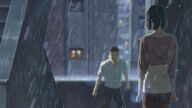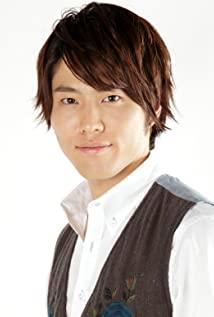Affected by the movie, I was a little interested in Japanese haiku for a while, and I bought one or two haiku collections as a pastime. I once saw some comments on Japanese haiku in a small book: Japanese waka and haiku are almost all emotional support, readable and sensible, but the author's original intention, and the endless artistic conception space outside the sentence. They face fragility and emptiness and capture the most subtle and inconspicuous beauty in life. What they write is all natural, and they don't even ask for deliberately neat sentence patterns.
"The Garden of Words" is like a beautiful Japanese poem, once again showing the beauty of one thought and one heart.
At the beginning of the story, it starts with a Japanese song by the heroine Yukino, and at the end of the story, the actor Qiuyue's answering song is used as the sublimation of the two people's emotions. The response from the beginning to the end is a kind of exquisite beauty.
Even, you can find two very obvious images, like analyzing a poem, to capture the main point of the story.
·Rainy day-symbolizes the emotional line between two people.
Rainy day is the first meeting of the two. Waiting for the rainy day, it does not unconventionally imply the longing and nostalgia for each other. The arrival of heavy rain is the sublimation of the two people’s emotions and also implies the trend of the plot. The preview of the climax, after the heavy rain, the world gets fresh air, and what the two get is inner peace and mutual understanding.
·Shoes-
the sketches related to shoes, the tools and leather used to make shoes, expensive hand-made shoe books, and the finished shoes that symbolize the trajectory of dreams .
In this image, the boy is approaching his dream step by step, without the need to focus on his struggle, just a few pictures can convey his persistence to the dream.
The extension of shoes is the pace. A woman still has a girl in her heart. She said that she was not smarter at the age of twenty-seven than she was when she was fifteen. She was frustrated in reality, so she stopped in place. The teenager regards her as his muse, hoping to make a pair of shoes for her, hoping that she can go further in his shoes. Here, it reflects this relationship, not a simple, vulgar love. They don't necessarily want to claim each other as their own. As long as they are walking on the road, they firmly believe that they can meet again someday.
In the transmission of this belief, the images of rain and shoes are also blended with each other. The rain is the bottleneck that the two feel about the status quo and their stay; while the shoes are the symbol of each other's going on again. Doesn't this stop and go also contain a kind of beauty and hope.
Waka is
faintly thundering, and the sky is hazy, but I hope the wind and rain can keep you here.
There is faint thunder, and the sky is cloudy, even if there is no rain, I will stay here.
View more about The Garden of Words reviews











